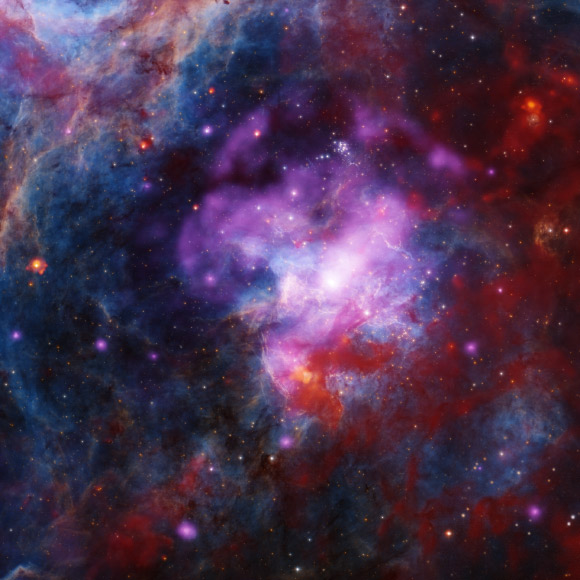30 Doradus B, also cataloged as NGC 2060, is found in the Large Magellanic Cloud, a small satellite galaxy of the Milky Way.
At the center of this complex landscape of brilliant, colorful gas clouds is the supernova remnant 30 Doradus B. Image credit: NASA / CXC / Penn State University / Townsley et al. / STScI / HST / JPL / CalTech / SST / SAO / J. Schmidt / N. Wolk / K. Arcand.
30 Doradus B is part of a large star-forming region where stars have been continuously forming for the past 8 to 10 million years.
It is a complex landscape of dark clouds of gas, young stars, high-energy shocks, and superheated gas, located 160,000 light-years away from Earth in the Large Magellanic Cloud.
In a new study, National Taiwan University astronomer Wei-An Chen and colleagues analyzed high-resolution multiwavelength images of 30 Doradus B from several ground- and space-based telescopes, including the NASA/ESA Hubble Space Telescope, the Australian Square Kilometre Array Pathfinder, NASA’s Spitzer Space Telescope and Chandra X-ray Observatory.
The researchers detected a faint shell of X-rays that extends about 130 light-years across.
The Chandra data also revealed that 30 Doradus B contains winds of particles blowing away from a pulsar, creating what is known as a pulsar wind nebula.
When taken together with data from Hubble and other telescopes, the researchers determined that no single supernova explosion could explain what is being seen.
Both the pulsar and the bright X-rays seen in the center of 30 Doradus B likely resulted from a supernova explosion after the collapse of a massive star about 5,000 years ago.
The larger, faint shell of X-rays, however, is too big to have resulted from the same supernova.
“Instead, we think that at least two supernova explosions took place in 30 Doradus B, with the X-ray shell produced by another supernova more than 5,000 years ago,” the scientists said.
“It is also quite possible that even more happened in the past.”
“This result can help us learn more about the lives of massive stars, and the effects of their supernova explosions.”
A paper on the findings was published in the Astronomical Journal.
_____
Wei-An Chen et al. 2023. New Insights on 30 Dor B Revealed by High-quality Multiwavelength Observations. AJ 166, 204; doi: 10.3847/1538-3881/acff72
>>> Read full article>>>
Copyright for syndicated content belongs to the linked Source : Breaking Science News – https://www.sci.news/astronomy/30-doradus-b-two-supernova-explosions-12587.html
